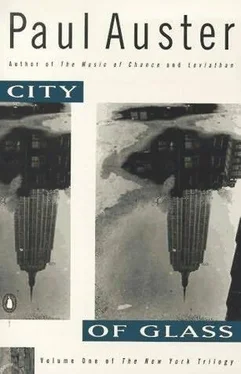Paul Auster - City of Glass
Здесь есть возможность читать онлайн «Paul Auster - City of Glass» весь текст электронной книги совершенно бесплатно (целиком полную версию без сокращений). В некоторых случаях можно слушать аудио, скачать через торрент в формате fb2 и присутствует краткое содержание. Жанр: Современная проза, на английском языке. Описание произведения, (предисловие) а так же отзывы посетителей доступны на портале библиотеки ЛибКат.
- Название:City of Glass
- Автор:
- Жанр:
- Год:неизвестен
- ISBN:нет данных
- Рейтинг книги:5 / 5. Голосов: 1
-
Избранное:Добавить в избранное
- Отзывы:
-
Ваша оценка:
- 100
- 1
- 2
- 3
- 4
- 5
City of Glass: краткое содержание, описание и аннотация
Предлагаем к чтению аннотацию, описание, краткое содержание или предисловие (зависит от того, что написал сам автор книги «City of Glass»). Если вы не нашли необходимую информацию о книге — напишите в комментариях, мы постараемся отыскать её.
City of Glass — читать онлайн бесплатно полную книгу (весь текст) целиком
Ниже представлен текст книги, разбитый по страницам. Система сохранения места последней прочитанной страницы, позволяет с удобством читать онлайн бесплатно книгу «City of Glass», без необходимости каждый раз заново искать на чём Вы остановились. Поставьте закладку, и сможете в любой момент перейти на страницу, на которой закончили чтение.
Интервал:
Закладка:
This helped somewhat. But the letters continued to horrify Quinn. The whole thing was so oblique, so fiendish in its circumlocutions, that he did not want to accept it. Then doubts came, as if on command, filling his head with mocking, sing-song voices. He had imagined the whole thing. The letters were not letters at all. He had seen them only because he had wanted to see them. And even if the diagrams did form letters, it was only a fluke. Stillman had nothing to do with it. It was all an accident, a hoax he had perpetrated on himself.
He decided to go to bed, slept fitfully, woke up, wrote in the red notebook for half an hour, went back to bed. His last thought before he went to sleep was that he probably had two more days, since Stillman had not yet completed his message. The last two letters remained-the "E" and the "L." Quinn's mind dispersed. He arrived in a neverland of fragments, a place of wordless things and thingless words. Then, struggling through his torpor one last time, he told himself that El was the ancient Hebrew for God.
In his dream, which he later forgot, he found himself in the town dump of his childhood, sifting through a mountain of rubbish.
9
THE first meeting with Stillman took place in Riverside Park. It was mid-afternoon, a Saturday of bicycles, dog-walkers, and children. Stillman was sitting alone on a bench, staring out at nothing in particular, the little red notebook on his lap. There was light everywhere, an immense light that seemed to radiate outward from each thing the eye caught hold of, and overhead, in the branches of the trees, a breeze continued to blow, shaking the leaves with a passionate hissing, a rising and failing that breathed on as steadily as surf.
Quinn had planned his moves carefully. Pretending not to notice Stillman, he sat down on the bench beside him, folded his arms across his chest, and stared out in the same direction as the old man. Neither of them spoke. By his later calculations, Quinn estimated that this went on for fifteen or twenty minutes. Then, without warning, he turned his head toward the old man and looked at him point-blank, stubbornly fixing his eyes on the wrinkled profile. Quinn concentrated all his strength in his eyes, as if they could begin to burn a hole in Stillman's skull. This stare went on for five minutes.
At last Stillman turned to him. In a surprisingly gentle tenor voice he said, "I'm sorry, but it won't be possible for me to talk to you. "
"I haven't said anything," said Quinn.
"That's true," said Stillman. "But you must understand that I'm not in the habit of talking to strangers."
"I repeat," said Quinn, "that I haven't said anything."
"Yes, I heard you the first time. But aren't you interested in knowing why?"
"I'm afraid not."
"Well put. I can see you're a man of sense."
Quinn shrugged, refusing to respond. His whole being now exuded indifference.
Stillman smiled brightly at this, leaned toward Quinn, and said in a conspiratorial voice, "I think we're going to get along."
"That remains to be seen," said Quinn after a long pause.
Stillman laughed-a brief, booming "haw”-and then continued. "It's not that I dislike strangers per se. It's just that I prefer not to speak to anyone who does not introduce himself. In order to begin, I must have a name."
"But once a man gives you his name, he's no longer a stranger.
"Exactly. That's why I never talk to strangers."
Quinn had been prepared for this and knew how to answer. He was not going to let himself be caught. Since he was technically Paul Auster, that was the name he had to protect. Anything else, even the truth, would be an invention, a mask to hide behind and keep him safe.
"In that case," he said, "I'm happy to oblige you. My name is Quinn."
"Ah," said Stillman reflectively, nodding his head. "Quinn."
"Yes, Quinn. Q-U-I-N-N."
"I see. Yes, yes, I see. Quinn. Hmmm. Yes. Very interesting. Quinn. A most resonant word. Rhymes with twin, does it not?"
"That's right. Twin."
"And sin, too, if I'm not mistaken."
"You're not. "
"And also in-one n-or inn-two. Isn't that so?"
"Exactly. "
"Hmmm. Very interesting. I see many possibilities for this word, this Quinn, this… quintessence… of quiddity. Quick, for example. And quill. And quack. And quirk. Hmmm. Rhymes with grin. Not to speak of kin. Hmmm. Very interesting. And win. And fin. And din. And gin. And pin. And tin. And bin. Hmmm. Even rhymes with djinn. Hmmm. And if you say it right, with been. Hmmm. Yes, very interesting. I like your name enormously, Mr. Quinn. It flies off in so many little directions at once.
"Yes, I've often noticed that myself."
"Most people don't pay attention to such things. They think of words as stones, as great unmovable objects with no life, as monads that never change."
"Stones can change. They can be worn away by wind or water. They can erode. They can be crushed. You can turn them into shards, or gravel, or dust."
"Exactly. I could tell you were a man of sense right away, Mr. Quinn. If you only knew how many people have misunderstood me. My work has suffered because of it. Suffered terribly."
"Your work?"
"Yes, my work. My projects, my investigations, my experiments."
"Ah."
"Yes. But in spite of all the setbacks, I have never really been daunted. At present, for example, I am engaged in one of the most important things I have ever done. If all goes well, I believe I will hold the key to a series of major discoveries."
"The key?"
"Yes, the key. A thing that opens locked doors."
“Ah.”
"Of course, for the time being I'm merely collecting data, gathering evidence so to speak. Then I will have to coordinate my findings. It's highly demanding work. You wouldn't believe how hard-especially for a man of my age."
"I can imagine."
"That's right. There's so much to do, and so little time to do it. Every morning I get up at dawn. I have to be outside in all kinds of weather, constantly on the move, forever on my feet, going from one place to the next. It wears me out, you can be sure of that."
"But it's worth it."
"Anything for the truth. No sacrifice is too great."
"Indeed.”
"You see, no one has understood what I have understood. I'm the first. I'm the only one. It puts a great burden of responsibility on me."
"The world on your shoulders."
"Yes, so to speak. The world, or what is left of it."
"I hadn't realized it was as bad as that.
"It's that bad. Maybe even worse."
"Ah."
"You see, the world is in fragments, sir. And it's my job to put it back together again."
"You've taken on quite a bit."
"I realize that. But I'm merely looking for the principle. That's well within the scope of one man. If I can lay the foundation, other hands can do the work of restoration itself. The important thing is the premise, the theoretical first step. Unfortunately, there is no one else who can do this."
"Have you made much progress?"
"Enormous strides. In fact, I feel now that I'm on the verge of a significant breakthrough."
"I'm reassured to hear it."
"It's a comforting thought, yes. And it's all because of my cleverness, the dazzling clarity of my mind."
"I don't doubt it."
"You see, I've understood the need to limit myself. To work within a terrain small enough to make all results conclusive."
"The premise of the premise, so to speak."
"That's it, exactly. The principle of the principle, the method of operation. You see, the world is in fragments, sir. Not only have we lost our sense of. purpose, we have lost the language whereby we can speak of it. These are no doubt spiritual matters, but they have their analogue in the material world. My brilliant stroke has been to confine myself to physical things, to the immediate and tangible. My motives are lofty, but my work now takes place in the realm of the everyday. That's why I'm so often misunderstood. But no matter. I've learned to shrug these things off."
Читать дальшеИнтервал:
Закладка:
Похожие книги на «City of Glass»
Представляем Вашему вниманию похожие книги на «City of Glass» списком для выбора. Мы отобрали схожую по названию и смыслу литературу в надежде предоставить читателям больше вариантов отыскать новые, интересные, ещё непрочитанные произведения.
Обсуждение, отзывы о книге «City of Glass» и просто собственные мнения читателей. Оставьте ваши комментарии, напишите, что Вы думаете о произведении, его смысле или главных героях. Укажите что конкретно понравилось, а что нет, и почему Вы так считаете.












